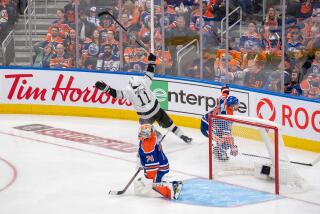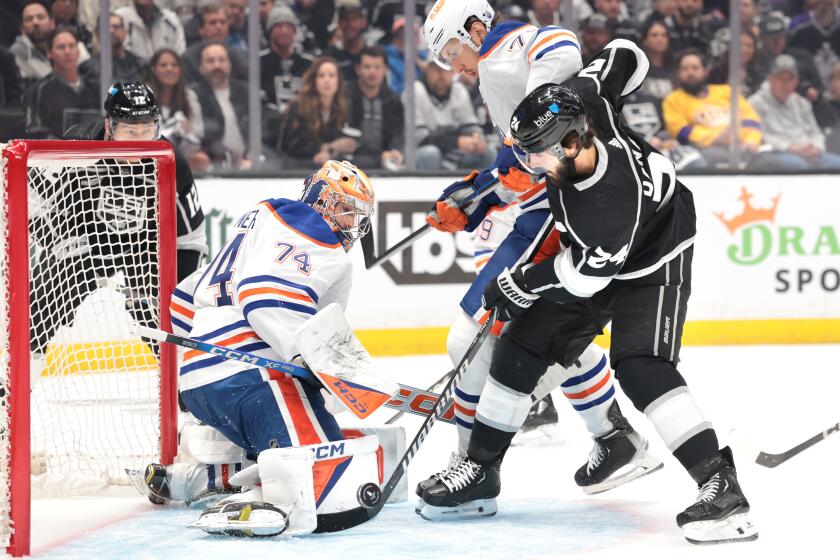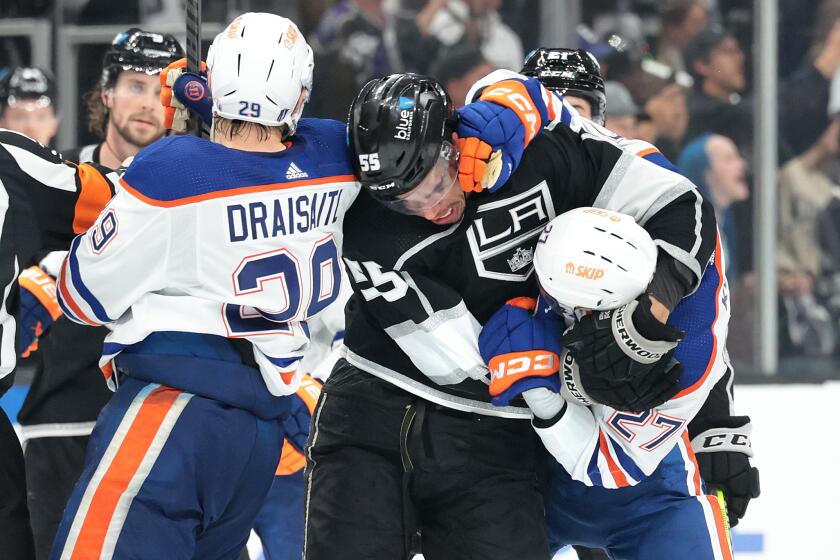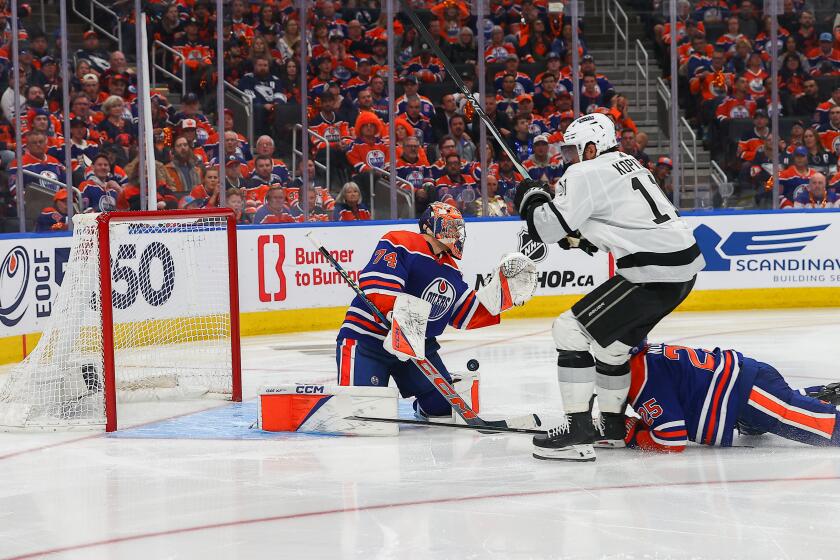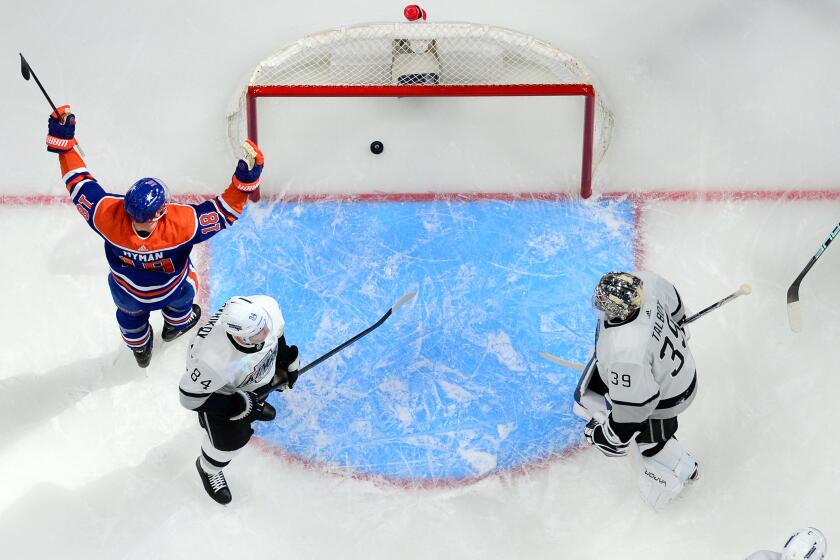Lemieux Has Hodgkin’s Disease; Doesn’t Appear Life-Threatening
Mario Lemieux’s condition was diagnosed as Hodgkin’s disease on Tuesday, but his doctor said the cancer didn’t appear to be life-threatening.
Lemieux was found to be in the early stages of the disease after a large lymph node was removed from his neck, according to a statement issued by the Pittsburgh Penguins and approved by team physician Charles Burke.
The disease is confined to the abnormal lymph node, and subsequent tests have shown no evidence of any other problems. Lemieux is expected to undergo radiation treatment for the next month.
The Penguins said Lemieux, who recently signed a seven-year, $42-million contract, could return to the lineup in four to six weeks, although that projection could change, depending on his response to radiation treatment.
Hodgkin’s disease, named for Thomas Hodgkin, the English physician who discovered it, is a disease of unknown cause characterized by the progressive enlargement of the lymph nodes and inflammation of some body organs such as the spleen and liver.
Lemieux was not available for comment and none of the Penguins’ team officials would discuss the illness. General Manager Craig Patrick was in California, reportedly meeting with team owner Howard Baldwin, but is to return for a news conference Friday that Lemieux will also attend.
Lemieux’s agent, Tom Reich, issued a statement from his California office saying, “He has a condition . . . that is in a mild stage. The prognosis is extremely good.”
Said Penguin winger Troy Loney: “I don’t know what more that guy is going to have to go through. I just feel for him. I couldn’t care less when he comes back, just that he gets healthy.”
Winger Bob Errey echoed those sentiments: “Any time you’re talking about cancer, you’re worried. You just have to trust what the doctors are saying and be positive.”
Among the side effects of the Hodgkin’s disease are anemia and continuous fever.
The fact that Lemieux is undergoing radiation therapy is an indication that doctors found the cancer in its early stages, said Dennis Meisner, an oncologist at Shady-side Hospital in Pittsburgh.
He said the Penguins’ contention that the type of Hodgkin’s diagnosed in Lemieux’s case is the “most favorable” might be misleading. “It is a cancer, and all types of cancer are very serious,” Meisner said. “As a cancer, it can become life-threatening.”
If the disease is limited to one lymph node that was removed, it is classified as Stage One Hodgkin’s, which has a cure rate of 95%, he said.
Radiation therapy for Hodgkin’s disease causes fatigue and weight loss, and could make someone too tired to play hockey, Meisner said. The cancer can spread to other parts of the body, including the bone marrow and lungs.
Hodgkin’s disease typically affects people who are 30 or younger and begins in a lymph node in the neck, he said.
For the last five years, Lemieux has been honorary chairman of the Pittsburgh Cancer Institute. In TV ads, Lemieux talks of losing several close family members to cancer, but does not specify who they where.
Lemieux, 27, was already out of the Penguins’ lineup with a flare-up of the chronic back problem that sidelined him for 103 games the last 3 1/2 seasons. Until last week, he was enjoying his most injury-free season in four years and was leading the NHL with 104 points, with 39 goals and 65 assists, while playing in 40 of the Penguins’ first 42 games. The Penguins’ 29-11-4 record is the best in the NHL.
Jeff Blatnick, who won a gold medal in Greco-Roman wrestling in the 1984 Olympics at Los Angeles, and former NFL lineman Karl Nelson also have been afflicted with Hodgkin’s disease. Nelson said he drew inspiration from Blatnick, and would be glad to help Lemieux.
“If he wants to, I’ll be more than willing to talk to him,” Nelson said. “It’s not going to be the easiest thing in the world. The radiation treatment, no matter what it is, is going to make him tired. It’s going to wipe him out.”
Blatnick’s condition was first diagnosed as Hodgkin’s in 1982, a day before his 25th birthday. He was told that because the disease was caught early, the five-year remission rate in cases such as his was 90-95%.
Blatnick was back at his construction job within two weeks. He tried, but was not quite strong enough, to make the U.S. national wrestling team in 1983, but made the Olympic team in 1984. He became only the second American to win an Olympic gold medal in Greco-Roman wrestling.
A year later, a recurrence was diagnosed. After six months of chemotherapy, Blatnick’s doctor said the tumor had receded and no other active cancer was found.
Nelson, an offensive tackle with the Super Bowl champion New York Giants in 1986, had his condition diagnosed soon after that season. He missed the 1987 season while undergoing treatment.
Nelson regained his starting spot in 1988, but was sidelined by an ankle injury after two games. He returned later in the year and played nine games. Nelson finished a second round of chemotherapy for Hodgkin’s in July of 1989 and sat out the season. He retired after the 1990 season and is a broadcaster for the team.
More to Read
Go beyond the scoreboard
Get the latest on L.A.'s teams in the daily Sports Report newsletter.
You may occasionally receive promotional content from the Los Angeles Times.
